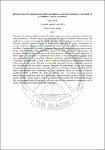Internal Control System and Revenue Collection in Local Governments A Case Study of Lira District Local Government
Abstract
The study assessed the effect of internal control system on revenue collection in lira district
local government. The main objective was to assess the effects of internal control system with
emphasis on control environment, control activities and monitoring of controls on revenue
collection. Specific objectives were to: examine the influence of control environment on
revenue collection; assess the effect of control activities on revenue collection; and determine
the effects of monitoring on revenue collection. The research adopted cross-sectional research
design with descriptive and quantitative approaches., and employed both primary and
secondary method of data collection with 93 respondents selected from the population of
district staffs and executives. To determine the reliability of research instruments a pilot study
was conducted before the actual data collection and further split half method was carried out
to calculate Cronbach alpha. A value of above 0.899 was obtained and confirmed the reliability
of the research instruments. The data was analyzed using both inferential (multiple regression
and correlation) and descriptive statistics (frequencies, percentages, mean and standard
deviation) and was presented by use of tables and charts. The study findings indicated that that
control environment and monitoring has no significant effect on revenue collection
(coefficient=0.542, p=0.005). The study recommends that, Lira district local government
should ensure compliance with laws, regulations and operational controls in their internal
control systems. Finally, there is need to avail competent internal and external professionals
who have responsibilities of making an effective and efficient control environment as well as
ensure effective control activities in their institution

